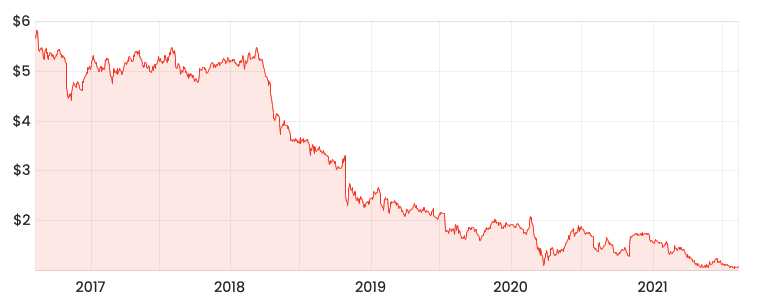Despite first-half FY21 underlying earnings rising 57%, AMP Ltd (ASX: AMP) has elected to cancel its interim dividend.
The market has reacted positively to the news, with shares in AMP up 1.39% to $1.09.
AMP share price

Profits up, dividends gone
Total revenue for the half decreased 8.0% to $1.1 billion due to fee reductions and low-performance fees.
Despite the revenue fall, AMP reported a 57.4% jump in profits for the first half to $181 million.
Primarily this was a result of reduced group office costs and a strong performance from the AMP Bank division.
Notwithstanding the profit jump, the board announced the interim dividend will be halted until after the demerger of the AMP Capital private markets business.
The spinoff is expected to be completed by the first half of 2022.
Divisional performance
The company recorded mixed results across its four business units.
Australia Wealth Management
Australian wealth management recorded a 17.2% fall in profits to $48 million. This was largely due to falls in management fees and a reduction in advice revenue.
Assets under management (AUM) increased 6.0% to $131.2 billion however this was a result of rising asset prices. Net inflows actually decreased by $2.7 billion, albeit this is an improvement on the prior period.
AMP Capital
Similar to Australian Wealth Management, AMP Capital achieved an 18.7% decrease in profit to $61 million. This was largely a result of a one-off performance fee paid into the prior period.
Assets under management (AUM) fell 3.4% to $187.2 billion due to net outflows of $6.7 billion.
The previously announced spinoff of AMP Capital private markets business
(real estate and infrastructure funds) into a separately listed company remains on track.
Ex-chairman of State Street Global Advisors – the 4th largest asset manager in the world, Shawn Johnson
has been appointed as Chief Executive of the new company.
The spinoff is expected to be completed by the first half of 2022.
New Zealand Wealth Management
New Zealand wealth management achieved an 11.1% increase in profits to $20 million.
AUM increased 8.1% to $12.5 billion led by a jump in asset prices and cost reductions.
AMP Bank
AMP Bank was the best performing division on the back of loan provision reversals and variable cost reductions.
Profit increased 76.0% for the half to $88 million.
The company noted favourable funding costs for the profit jump, which increased its net interest margin (NIM) to 1.71%. Mortgages in arrears improved six basis points at 0.72%.
Return on capital increased to 15.8%, outpacing market leader Commonwealth Bank of Australia (ASX: CBA) result.
Operational highlights
The company has completed reviews for its client remediation program as a result of the Royal Banking Commission. The total cost will be $823 million, which has been fully provisioned for.
The board announced a 15% cut to director fees. Unfortunately for shareholders, this is just a splash in the ocean compared to the 81% fall in share price over the past five years.
AMP remains well capitalised, with $452 million in excess capital above the prudential regulator’s requirements. The company also completed its $200 million buy-back during the period.
My take
I’m left perplexed with how to feel about AMP.
On one side profits are up, strong cost control across most segments and a new management team headed by Chief Executive, Alexis George.
Conversely, the company is facing net outflows from customers, rising pressure on fees and a massive client remediation program.
That’s before even looking at the shareholder value destruction over the past five years.
I’m putting this one in the too hard basket for now.
As Charlie Munger coined, “I have a way of handling a lot of problems — I put them in what I call my ‘too hard pile,’ and just leave them there. I’m not trying to succeed in my ‘too hard pile”.
To read more news and analysis, I’d recommend signing up for a free Rask account and accessing our full stock reports. Click this link to join for free and access our analyst reports.











